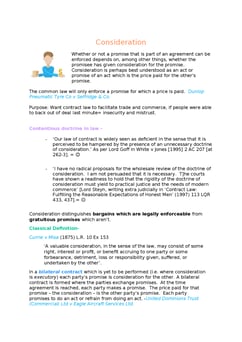Central London Property v High Trees House [1947] KB 130
Judgement for the case Central London Property v High Trees House
Table Of Contents
KEY POINTS
A Contract Agreement is a legally binding document designed to establish legal relations between the parties involved.
-
In a Contract Agreement, the promisor knows that the promisee will act upon the promises outlined in the contract. This mutual understanding is fundamental to the agreement's enforceability.
The promisor anticipates that the promisee will take specific actions or refrain from certain activities based on the agreed-upon terms.
The enforceability of a Contract Agreement is not solely contingent on the presence of strict consideration. Even without explicit consideration, the legal system recognises and upholds the agreement's binding nature, emphasising the parties' intent to be legally bound by their promises.
Contracts under seal represent a distinct category where the agreement is authenticated by a formal seal, often enhancing its legal significance.
-
The concept of variation by agreement of lesser value allows parties to modify the terms of their agreement without strict adherence to the original terms.
Estoppel is a legal principle that prevents a party from denying or asserting a fact contradicting a previous statement or act.
FACTS
-
On September 24, 1937, Central London Property Trust Ld., ("Plaintiff") company leased a block of flats to High Trees House Ld., ("Defendant") company, a subsidiary of Plaintiff, for a term of ninety-nine years from September 29, 1937, at a ground rent of £2,500 per year.
Due to the wartime conditions in early 1940, only a few flats were occupied, leading to the defendant's inability to pay the stipulated rent using the flat rents.
As a result, on January 3, 1940, the Plaintiffs confirmed in writing to the Defendants that the ground rent would be reduced from £2,500 to £1,250, effective from the beginning of the lease term.
The Defendants adhered to the revised rent payment.
All flats were occupied by the beginning of 1945, but the Defendants continued to pay the reduced rent.
In September 1945, the plaintiffs claimed, through a letter, that the rent was payable at the original rate of £2,500 per year.
The Plaintiffs initiated friendly proceedings, claiming the difference in rent rates for the quarters ending September 29 and December 25, 1945.
In response, the Defendants, in their defence, contended that the agreement for the reduced ground rent applied throughout the entire lease term.
JUDGEMENT
The judgment established that when parties create an arrangement intending legal relations, and one party makes a promise known and acted upon by the other, the court considers it binding.
-
This holds even if the promise lacks strict consideration and modifies a sealed contract to a lesser value.
The January 1940 agreement between the plaintiffs and defendants fell into this category.
The court ruled that the ground rent reduction was binding on the plaintiff company only if the conditions persisted.
When they ceased in 1945, the plaintiffs were entitled to recover the ground rent at the 1946 rate specified in the lease.
COMMENTARY
The Contract Agreements' elements emphasise their role in creating legally binding relations and the importance of mutual understanding. It notes that enforceability isn't solely dependent on strict consideration, showcasing the legal system's commitment to honouring parties' intentions.
The introduction of Contracts under seal and the concept of variation by agreement of lesser value adds complexity, while Estoppel is introduced as a legal principle.
The practical case involving Central London Property Trust Ld. and High Trees House Ld. exemplifies these concepts, with wartime conditions prompting a rent reduction.
The subsequent judgment highlights the court's consideration of agreements intending legal relations, even modifying a sealed contract.
ORIGINAL ANALYSIS
Defendant was letting flats in a building owned by Plaintiff and couldn’t pay the rent.
Plaintiff agreed to reduce the rent for a period of time, but later tried to claim arrears for the full level of rent.
The court (Denning J) ruled that as a result of the equitable doctrine, a promise to accept a smaller sum in discharge of a larger sum, if acted upon, is binding regardless of the absence of consideration.
This followed the Hughes ruling.
RELATED CASES
For Further Study on Central London Property v High Trees House
Need instant answers? Our AI exam tutor is here to help.
Ask questions 🙋 Get answers 📔 It's simple 👁️👄👁️
Our AI is educated by the highest scoring students across all subjects and schools. Join hundreds of your peers today.
Get StartedSimilar Cases
Related Product Samples
These product samples contain the same concepts we cover in this case.
| Contract Law | Promissory Estoppel Notes (6 pages) |


 Since 2010, Oxbridge Notes has been a trusted education marketplace, supplying high-quality materials from top achievers at universities like Oxford, Cambridge, LSE, Harvard, and Yale.
Since 2010, Oxbridge Notes has been a trusted education marketplace, supplying high-quality materials from top achievers at universities like Oxford, Cambridge, LSE, Harvard, and Yale.